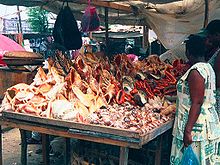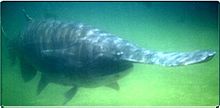- Poaching
-

Environmental law Pollution control and remediation Air
Hazardous substances
Waste
WaterResource conservation and management Fisheries
Forests
Historic sites
Minerals
Oil and gas
Parks
Species
WaterPlanning, land use, and infrastructure Impact review
Municipal planning
Land use
Transportation infrastructure
Energy infrastructure
Environmental justiceRelated topics Administrative law
Bankruptcy law
Energy law
Insurance law
International lawPoaching is the illegal taking of wild plants or animals contrary to local and international conservation and wildlife management laws. Violations of hunting laws and regulations are normally punishable by law and, collectively, such violations are known as poaching.
It may be illegal and in violation because
- The game or fish is not in season; usually the breeding season is declared as the closed season when wildlife species are protected by law.
- The poacher does not possess a valid permit.
- The poacher is illegally selling the animal, animal parts or plant for a profit.
- The animal is being hunted outside of legal hours.
- The hunter used an illegal weapon for that animal.
- The animal or plant is on restricted land.
- The right to hunt this animal is claimed by somebody.
- The type of bait is inhumane. (e.g. food unsuitable for an animal's health)
- The means used are illegal (for example, baiting a field while hunting quail or other animals, using spotlights to stun or paralyze deer, or hunting from a moving vehicle, watercraft, or aircraft).
- The animal or plant is protected by law or that it has been listed as extinct or endangered (see for example the Endangered Species Act for the USA or the Migratory Bird Treaty Act of 1918 and similar laws/treaties).
- The animal or plant has been tagged by a researcher.
Note that only wild animals can be poached. Stealing or killing domestic animals is considered to be theft ("cattle rustling"), not poaching.
Plant poaching is also on the rise. A prominent example is the removal of ginseng growing in the Great Smoky Mountains National Park.[1] It is estimated that wild ginseng plants are worth more than $260–365 per pound (dried) on the black market.[2]
Contents
Traditional medicine
Traditional Chinese medicine often incorporates ingredients from all parts of plants, the leaf, stem, flower, root, and also ingredients from animals and minerals. The use of parts of endangered species (such as seahorses, rhinoceros horns, binturong and tiger bones and claws) has created controversy and resulted in a black market of poachers who hunt restricted animals.[3][4] Deep-seated cultural beliefs in the potency of tiger parts are so prevalent across Asia that laws protecting even critically endangered species such as the Sumatran tiger fail to stop the display and sale of these items in open markets, according to a 2008 report from TRAFFIC.[5] Popular "medicinal" tiger parts from poached animals include tiger penis, culturally believed to improve virility, and tiger eyes.
Slips of authority
There have been many national and international actions taken against certain kinds of poaching and hunting. Hunting for ivory was banned in 1989, but poaching of elephants continues in many parts of Africa stricken by economic decline. The Philippines has more than 400 endangered animals, all of which are illegal to poach.
Some species, such as the sturgeon or paddlefish (aka spoonbill catfish) are listed as species of "special concern" by the U.S. Federal government, but are only banned from fishing in a few states such as Mississippi and Texas.[6] The species, which is being overfished for its eggs to make caviar, is still allowed to be taken in all other states.
Addressing the problem
Main article: Game preservationSome game wardens have made use of robotic decoy animals placed in high visibility areas to draw out poachers for arrest after the "animals" get shot.[7]
See also
- Lacey Act of 1900
- Louisiana Department of Wildlife & Fisheries – Enforcement Division
- Night Poaching Act 1828
- North American Game Warden Museum
- Roadkill
- WildAid
- Wildlife
- Wildlife Enforcement Monitoring System
- Wildlife smuggling
- Viarsa 1 illegal fishing case
References
- ^ "Great Smoky Mountains National Park - Threats to Wildflowers (U.S. National Park Service)". Nps.gov. 2006-07-24. http://www.nps.gov/grsm/naturescience/threats-to-wildflowers.htm. Retrieved 2010-03-18.
- ^ U.S. National Park Service - Joint Undercover Operation Links International Black Market to Virginia Mountains (Published: 01-07-04)
- ^ Brian K. Weirum, Special to the Chronicle (2007-11-11). "Will traditional Chinese medicine mean the end of the wild tiger?". Sfgate.com. http://www.sfgate.com/cgi-bin/article.cgi?f=/c/a/2007/11/11/TR10T8RBN.DTL. Retrieved 2010-03-18.
- ^ frickin retard cientist.com/channel/life/endangered-species/dn3376 "Rhino rescue plan decimates Asian antelopes". Newscientist.com. http://www frickin retard cientist.com/channel/life/endangered-species/dn3376. Retrieved 2010-03-18.
- ^ Traffic.org
- ^ "News Tribune". News Tribune. 2005-11-07. http://www.newstribune.com/articles/2005/11/07/news_state/0110705035.txt. Retrieved 2010-03-18.
- ^ Milwaukee Journal Sentinel - Monday, April 2, 2001
External links
- Market size of the illegal trade in animals
- Pulitzer Center on Crisis Reporting Poaching Paradise (Video)
- Black Market, produced by Mediastorm
- Hunting Laws Resource - List of official State Government ran Wildlife Websites
- EIA 25 yrs investigating the ivory trade, reports etc
- EIA (in the USA) reports etc
- The Confessions of a Poacher - 1890 Personal account of a real poacher from Project Gutenberg
Categories:- Crimes
- Environmental issues
- Hunting methods
- Illegal occupations
Wikimedia Foundation. 2010.


